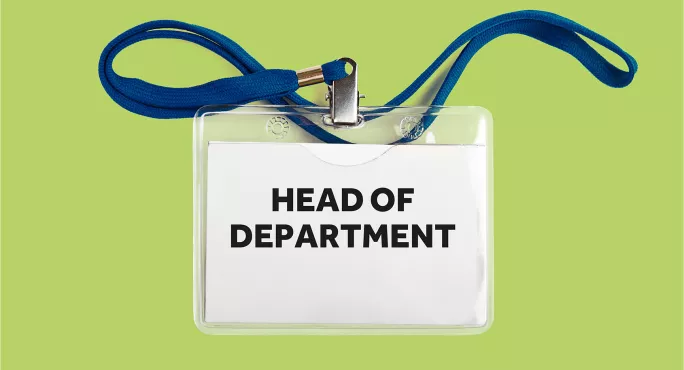
How do I become a head of department?

A head of department role is often the first rung on the ladder of school management. Depending on your subject and size of school, the role could involve leading a team of many teachers, or just one or two.
Running your own department has all kinds of benefits: you will be the one to make the final decision on curriculum content, and how students learn in the classroom. However, with this comes great responsibility as you are also accountable for the results of your department, and it is your job to line manage the members of your team.
Some heads of department might be supported by a team of deputy heads of department. In these structures the responsibilities are typically split by key stages.
Read: How to become an assistant head
Watch: Two-minute tutorials for job hunters
Listen: How to interview candidates on lock-down
What does a head of department do?
A head of department leads the team of teachers who deliver the lessons for their particular area.
Maths, English and science are usually both departments and faculties, but other subjects will typically be grouped together to form faculties. These subjects will have heads of department, who then report to the head of faculty.
Collaborative working
Although the role of head of department is considered to be a curriculum one, in your role you will be expected to work with the pastoral leaders to support the students in their learning.
For example, as head of department behaviour issues may be resolved together with a head of year if there is a pattern forming in the sanctions being issued to a particular student, or by a specific teacher.
As well as working with the pastoral team, you will be expected to work together with the data, teaching and learning, and curriculum leads.
Decisions about exam boards, texts and topics, and curriculum organisation will fall to the head of department, as will set organisation and teacher allocation.
In addition to this, the head of department is in charge of managing their team and observing lessons to ensure that their department is running smoothly. Putting the timetable together, organising a cover system, stocking the stationery cupboard: all of these things fall to the head of department.
As a head of department you will be line managed by a member of the senior leadership team. This might take place during fortnightly line management sessions where you discuss issues and your strategic plans for the department.
What is a head of department’s salary?
There is no separate pay scale for heads of department. Instead, a head of department is paid as a classroom teacher and also gets a teaching and learning responsibility (TLR) payment for running the department. TLR payments can vary from TLR 2 £2,796 - £6,829, to TLR 1 £8,069 -£13,654. The payment will vary according to the size of department and school.
A TLR3 payment will not be used for head of department, as these are temporary payments used for a short term one off project. You can be paid either TLR 1 or TLR 2, not a combination of both.
How do I become a head of department?
If you are currently a classroom teacher interested in becoming a head of department, then the first question you should ask yourself is, “Am I an excellent classroom teacher?”.
Pritesh Raichura, Michaela School in West London, says teachers should prepare now to be the role models their team will need once they’re leading them.
“Your role as head of department will include being responsible for your department’s development,” he says. “So you need to be able to be both a good role model, and invite others to observe you, and also able to analyse others’ teaching and guide them. You can only do this from a position of expertise.”
New priorities
Sarah Barker, former head of department, warns that you need to prepare for the change that head of department brings.
“You need to know that you have your own classroom practice nailed 100% because this will go from being your top priority to a much lower one,” she cautions.
“Suddenly, everybody else’s classes will matter to you too, and you need to be able to support your team,” Barker says.
Ruth Ashbee, assistant headteacher in charge of curriculum at Telford Priory School agrees, and adds a tip for success.
“You need to streamline everything you already do to create the capacity to fit in the extra tasks,” she suggests.
“What helps is being able too teach good lessons with minimal planning. If you can become adept at planning your tasks into your day it will allow your non-contacts to be as productive as possible.”
A taste of responsibility
If you know that you are going to look for head of department roles in the near future, then asking for opportunities to lead on small projects is a good idea.
It would be wise to ask if you can take on a responsibility like writing a scheme of work, or offering to lead training on an area of your expertise. These are good ways to test the head of department waters. Taking on small responsibilities will help you to see if you like leading a team and are suited to the head of department role.
How to find the right role
Keep an eye out for internal advertisements for smaller posts of responsibility.
The experience of holding a smaller TLR is a useful way to gain experience before applying to be a head of department. It will also mean you will probably be working with heads of department more closely, and will gain an insight into how to run a department effectively.
What experiences will interviewers look for in a new head of department?
A strong understanding of the exams sat in your subject, and how the curriculum key stages link together, is desirable for a new head of department. Therefore, taking on exam marking or undertaking research of examinations you haven’t taught yet would be a good idea.
Adam Boxer, head of science at The Totteridge Academy, London, believes experience of liaising with other teachers is a good preparation for the role.
“Before I was appointed in this role, I had some non-teaching leadership roles that involved dealing with people outside my faculty and running meetings” he says. “This definitely helped prepare me for the day-to-day challenges of managing a team.”
If your school offers A levels and you haven’t had an opportunity to deliver a course yet, then it would be a good idea to ask if you can have it on your timetable for the following year. Also, if your school offers “step up” opportunities, where you can job shadow or act up for a short period, it is worth asking if you can do this to gain the extra experience.
Where could it lead to?
Although many people enjoy the role of head of department so much that they stay put in that post, it is also a gateway to leadership positions. You may wish to continue on the curriculum side, and apply for assistant headships with responsibilities for teaching and learning, data or curriculum. However, you may now move into the pastoral side and progress to special educational needs and disability coordinator or a key stage leader.
A head of department of geography at a new school in West London considers the role as essential for anyone considering leadership positions but also warns of the drawbacks of moving up. “It’s great training for senior leadership, although it would be very hard to let go of the detailed curriculum work I love so much.”
There is always the option of remaining as head of department but moving between different schools, and varying your experience that way. As every school is different, you will have the challenge of developing different staff in varying contexts, but without increasing the level of responsibility you will be expected to take on.
When I’m searching for a job, what should I look out for?
If you are using Tes to search for jobs, make use of the filters to find the right roles for you. Also, look out for schools using different terms, such as “director” or “subject lead’’, and check the pay to see which TLR is attached to the post.
Be sure to click through and read all of the attachments on the advertisement. This will give you a better idea of the way the head of department role is organised at that school, because you cannot assume it will be the same as at your current one.
WATCH: Using SWOT analysis as a teacher
Head of department jobs naturally come up less frequently than other posts, so do set up job alerts to save you constantly searching.
What kind of interview can I expect for a head of department role?
A head of department interview will usually last one day, and will include an observed lesson and a data activity. Your interview will normally involve questions pertaining to the details you included in your application, safeguarding questions and reflections on your lesson. Sometimes you will be asked to observe another teacher’s lesson and be observed giving them feedback.
Head of department interview questions
- What is your vision for the faculty?
- We have seen several changes in the curriculum over the past few years. How have these impacted on the reality of teaching for teachers of your subject?
- What extracurricular activities will your faculty offer?
Browse the latest head of department jobs.
